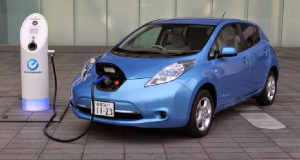
A Bright Future Ahead For Electric Cars In India
Ever thought about ditching a fuel station to re-fuel your car and instead, plugging-in to recharge your car? Sounds interesting, isn’t it? Here comes the concept of electric vehicles!
The concept of green living is creating a new buzzword, and the use of electric vehicles is gaining an immense popularity in India. Earlier, the use of electric cars was an alien concept, but it is not like that these cars never existed. A quick look at the history of cars will tell you that people started using electric cars way back in mid-19th century. In fact, these cars were popular even before the invention of fuel cars (petrol or diesel). Till 1900, the record of fastest speed of a car was recorded by an electric car. But in early 20th century, fuel cars started offering better speed and fuel efficiency, thereby putting electric cars out of vogue. But now life has come full circle and the rising concerns for pollution caused by fuel vehicles have compelled people to look at electric cars as an alternative.
Electric cars have received high popularity in India due to high pollution and global warming. Further, these vehicles become more popular when Delhi government launchedtraffic rationing policy “odd-even plan” to combat the menace of pollution in the capital.
Rise in pollution level leads to high popularity of electric vehicles (EVs)
As per the report of World Health Organization (WHO), 13 of the top 20 most polluted cities in the world are from India. In fact, researchers from the University of Chicago, Harvard and Yale reported that India’s worst air pollution level is reducing the life expectancy of over half of the population by three years. In 2015, India’s pollution level was much higher than that of China and the number of average particular matter exposure was also at the higher level, as per the Greenpeace analysis of NASA satellite data.
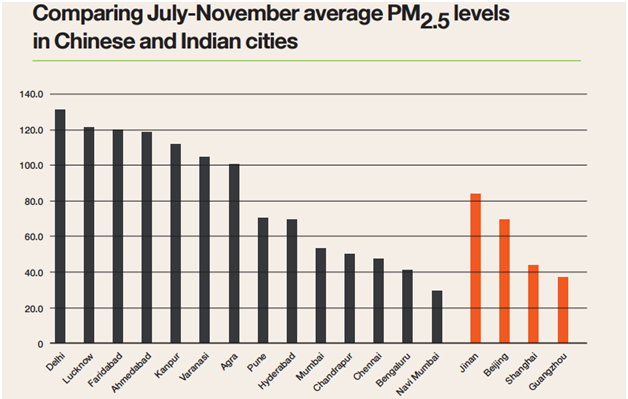
Source: Scroll.in
Further, the high sale of vehicles is also deteriorating the air quality in India. The country will see a strong production growth across all segments by 2020, as per the Automotive Component Manufacturing Association of India-EY Vision 2020 study. The sale of cars rose by 7.8% from the last year to 2.025 million units by the end of March, according to the Society of Indian Automobile Manufacturers (SIAM).
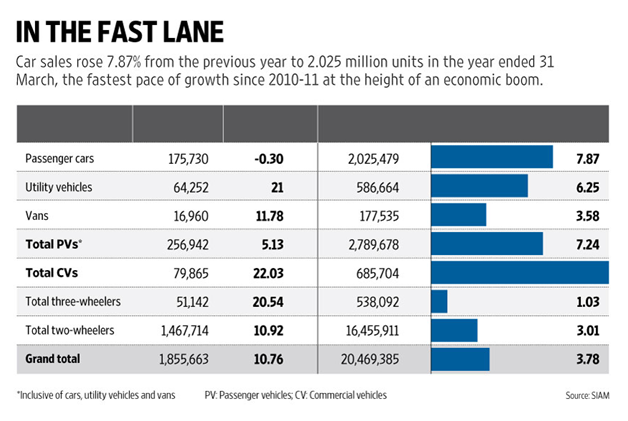
Source: Livemint.com
Though, Mr. ArunJaitley, India’s Finance Minister, has imposed a new tax on car sales to fight high air pollution and congestion, the move is unlikely to curb the sales or demand of vehicles.Further, with the average income of people rising steadily, automakers are expecting a further rise in vehicle sales in India. For a country that is already battling rising levels of air pollution, electric cars could turn out to be a blessing in disguise.
How electric cars work?
An electric car is powered by an electric motor instead of fuel. The electric motor receives power on the basis of driver’s use of an accelerator pedal. Electric cars use power stored in its rechargeable batteries installed in the vehicle, which can easily be recharged by common household electricity. Mainly, electric cars have the following three components:
- Energy storage unit
- Controller
- Propulsion system
How electric cars can help?
Electric cars are eco-friendly as they don’t require fuel and they run on electricity. The increasing usage of electric vehicles will go a long way in improving the quality of air in India. Apart from environmental benefits, electric vehicles have other advantages also. Most vehicles are equipped with intelligent safety features to prevent fatal accidents. Fuel economy is another benefit of electric cars, which are easy to operate as compared to gasoline-powered vehicles.
Electric Vehicles Vs Conventional Vehicles
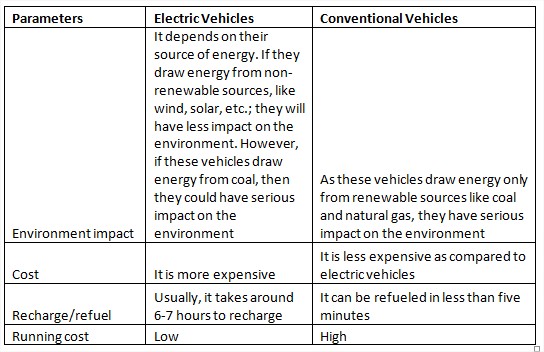
Companies manufacturing electric vehicles in India
Some of the automobile companies manufacturing electric vehicles in India are:
- Mahindra Reva Electric Vehicles
- Electrotherm
- Ajanta Manufacturing
- Maruti Suzuki India
- Hero Electric Vehicles
- ToyataKirloskar Motor
- Lohia Auto Industries
- Ampere Vehicles
- Chris Motor
- Avon Cycles Limited
An Electric Acceleration: India to become 100% electric vehicle country
Mr. Piyush Goyal, India’s Minister of Power, Coal, New and Renewable Energy, said that India is planning to become a 100% electric car country by 2030. The government is working hard to develop a sustainable eco-system for electric as well as hybrid vehicles. On the one hand, the government is clamping down on traditional-fuel propelled vehicles, while on the other; it is encouraging the use of eco-friendly vehicles with the launch of National Electric Mobility Mission Plan (NEMMP). The aim of NEMMP is to offer monetary incentives to popularize the use of electric vehicles in the country. Further, to boost the sale of eco-friendly vehicles, the government has launched— Faster Adoption and Manufacturing of hybrid and electric vehicles (FAME) to give Rs 795 crore support till 2020 for the manufacturing and sale of electric vehicles. Depending on their technology, electric vehicles will be given incentives, ranging between Rs 1,800 to Rs 66 lakh. Similarly, in three-wheeler vehicle segment, it is in the range of Rs 3,300 to Rs 61,000. In four-wheelers battery-operated vehicles, it is in the range of Rs 13,000 to Rs 1.38 lakh, in light commercial segment; it is between Rs 17,000 and Rs 1.87 lakh. In case of buses, the incentive is in the range ofRs 34 lakh toRs 66 lakh.
The government aims to bring six million electric and hybrid vehicles on roads by 2020. Incentives have already drove sales of electric vehicles to 22,000units in 2015-16 as compared to 16,000 units during 2014-15. In the past also, incentives had played an imperative role in triggering the demand of electric vehicles in the country. In 2010-2012, when the Ministry of New and Renewable Energy first implemented the alternate fuel for surface transportation programme, the sale of electric vehicles increased in a range of 85,000-1,00,000 units.
While presenting the Union Budget 2016-17, Mr. Jaitley launched a slew of incentives for these cars. The government has continued with nil basic custom duty and 6% excise on different parts of electric and hybrid vehicles beyond 31st March. It has also extended duty concessions on specific parts of these vehicles. Besides this, the government is also taking steps to push the development of indigenous batteries to popularize the use of electric vehicles. For this purpose, the Automotive Research Association of India (ARAI) has partnered with the Vikram Sarabhai Space Centre (VSSC) to develop battery technology for electric and hybrid vehicles. While doing laboratory tests, the team found out that batteries used in space are suitable for automobiles also. Now, ARAI has made a plan to test batteries in an automotive environment and release a prototype in a near future. Apart from batteries, ARAI is also planning to develop battery management system (BMS) and thermal management to make batteries safer for electric vehicles. ARAI is hopeful to kick-start a ‘Made in India’ battery programmeto produce batteries on a mass level and cut their cost.
To dissuade people from buying vehicles that run on conventional fuel, the government has levied an infrastructure cess of 1% on small petrol, LPG and CNG cars (with engine capacity up to 1200cc), 2.5% on diesel cars (with engine capacity not exceeding 1500cc) and 4% on high engine capacity vehicles and SUVs. However, electric vehicles are exempted from these taxes.
It’s not only the Central Government and related agencies that are showing interest towards battery operated vehicles. Following the rising pollution concern, state governments of Andhra Pradesh and Maharashtra are taking steps to waive taxes on electric vehicles. Delhi’s government has decided to lower VAT on electric vehicles by more than half to 5%. Similarly, Karnataka has exempted electric vehicles from all state taxes.
India’s first ever international electric vehicle expo in India
Last year in December, Mr. Nitin Gadkari, Union Minister for Road Transport & Highways, inaugurated EVEXPO 2015— India’s first ever international electric vehicle show. The event showcased latest technological developments and advancements in environment friendly vehicle, services and products for the safe transportation of passengers and goods. OK Play India launched 100% indigenously designed and developed e- rickshaw: E-Raaja. Also, Chinese company Yudi E Vehicle displayed a single-seat and a double-seat three-wheeler electric vehicle. The expo witnessed the participation of over 100 electric vehicle manufacturers from countries like China, Sweden, Germany, Japan etc.
Electric Vehicles at Auto Expo, 2016
From two-wheelers to passengers and commercial vehicle manufacturers, many green vehicles took center stage at this year Auto Expo. With pollution levels in metropolitan cities on the new height, electric vehicles sparked interest of automobile companies who launched various battery operated vehicles.
A look at some of the electric vehicles launched at Auto Expo, 2016
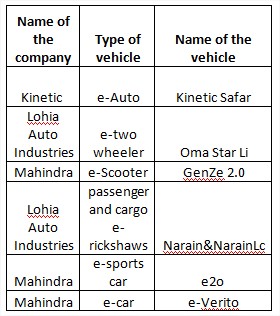
The electric wave caught the attention of commercial vehicle manufactures also. Heavy vehicle manufactures like Ashok Leyland and Tata Motors also unveiled their concepts. While Tata presented concepts of electric and hybrid cars, Ashok Leyland displayed ‘Hybus’, which it claimed to be India’s first non-plugin hybrid bus.
Are electric vehicles actually nature-friendly?
No, electric vehicles are not the final solution to keep a check on the pollution level in countries, especially India where coal is a predominant form of power generation. It is true that electric vehicles have the potential to curb carbon emissions, but it is important to understand that it depends on the type of electricity that charges the battery. If the electricity is produced by coal then obviously it would emit more carbon emissions. In fact, an electric car in India generates as much carbon as a 20 miles/gallon petrol vehicle in the USA.
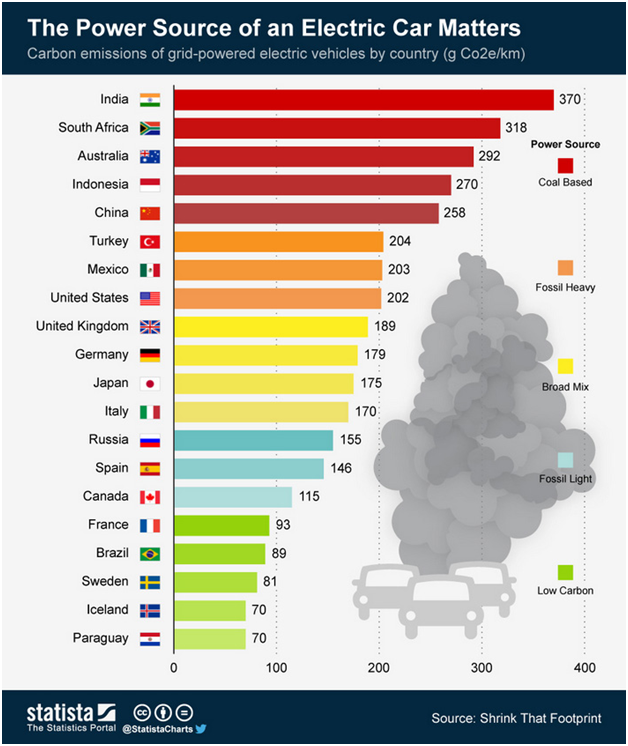
How your vehicle is charged plays an imperative role in deciding carbon emissions. To ensure the proper use of green cars, government bodies need to follow the below measures:
- Shift to renewable grid electricity
- Invest in solar energy
- Aggressively follow vehicle fuel efficiency
How electric cars will impact insurance?
By buying an electric car, you’re showing door to fuel vehicles but you can’t run away from the responsibility of owning car insurance, which is equally important for electric cars also. Furthermore, whether you drive an electric car or a conventional one, there will be no change in norms of car insurance. Electric cars are also insured like normal cars. You must possess at least third-party insurance to ply your vehicle on Indian roads. However, like other vehicles, electric cars are also susceptible to theft, flood, fire and other perils. Therefore, to protect your vehicle from all hazards, you should buy a comprehensive car insurance policy that offers complete 360 degree coverage.
Conclusion
Over the past few years, there have been repeated calls from environmentalists and activists to take steps to clear the country’s toxic air. Even the outcry has seen a slew of initiatives taken at the central and state levels. Delhi’s government odd-even traffic rationing got thumbs up from citizens who have showed more concerns towards vehicular pollution. Following a ban on diesel and petrol vehicles with engine capacity of more than 2000 cc, there has been an increase in sale of electric vehicles in Delhi, according to Mahindra Reva. Recently, Transportation app Ola has launched a new e-rickshaw category to help users book rides on electric vehicles in Delhi NCR region.
Though, some people may think that the time for electric vehicles may not yet be ripe for India, but the idea of non-polluting cars is surely maturing. The rising concern over pollution levels in Indian cities, clampdown on polluting vehicles and a subsidy scheme launched by the government have bolstered demand of electric vehicles in the country. Multiple promotional moves favoring electric vehicles may help in increasing adoption of electric vehicles on Indian roads in the mid-to-long term, if not in short term.